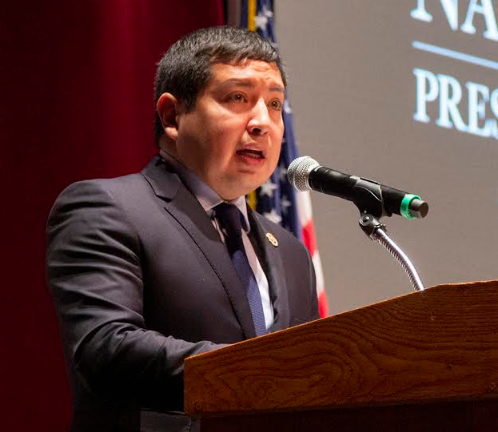
- Details
- By Native News Online Staff
LAKE CHARLES, La. — Coushatta Tribe of Louisiana Chairman David Sickey was among the dignitaries on hand who met with President Joe Biden on his presidential trip to Lake Charles, La. on Thursday.
President Biden was in the deep-red state to rally support for his expansive $2.3 trillion proposal, the American Jobs Plan.
With the aging Calcasieu River Bridge behind him, Biden pitched his once-in-a-lifetime infrastructure package. Sickey, the first Coushatta tribal chairman to ever meet with a sitting president of the United States, pivoted from infrastructure to the existential threat facing Indian Country – the Murdered and Missing Indigenous Women and Girls (MMIWG) crisis.
As he did in the previous night’s Native News Online’s “Crisis in Indian Country: Missing and Murdered Indigenous Women,” Chairman Sickey thanked President Biden for his leadership on the issue. Sickey spoke to the President about “Say Her Name,” the powerful new MMIWG documentary executively produced by the Coushatta Tribe, that focuses on what is described as an epicenter of the MMIWG tragedy, Bighorn County in Montana.
President Biden appears in the soon-to-be released new extended director’s cut of the critically acclaimed Somebody’s Daughter feature-length documentary that was also executively produced by the Coushatta Tribe. Both films are directed by Rain. Native News Online is hosting a special streaming forum to mark the release of Say Her Name on Thursday, May 13 at 7 pm - EDT. Chairman Sickey provided a copy of the documentary for the President.
Sickey met with President Biden the day after the Governor of Louisiana, John Bel Edwards, signed a sweeping executive order to create a Murdered and Missing Indigenous Women and Girls Task Force. Chairman Sickey collaborated with the Global Indigenous Council to draft the executive action, which in scope is arguably the most expansive MMIW/MMIP gubernatorial order of its kind to be adopted in the United States.
“We must remember that each victim is much more than a number but a loved one, whose family and friends are searching for answers,” Gov. Edwards said upon signing the executive order.
“There is a need for urgent action in order to combat this tragedy. Louisiana has a rich Indigenous heritage with four federally recognized Indian tribes and 11 state recognized tribes. I am grateful that this issue has been brought to the forefront. Louisiana is committed to partnering with federal, state, interstate, and intertribal efforts to address the injustice and violence done to indigenous women residing within our nation and our state,” Governor Edwards insisted.
Louisiana’s First Lady, Donna Edwards, recognized Chairman Sickey for his efforts on MMIWG. “This is such a serious issue, and I’m grateful to Coushatta Tribe of Louisiana Chairman David Sickey and other leaders who have been working tirelessly to bring attention to this injustice,” she said.
First Lady Edwards praised both Somebody’s Daughter and Say Her Name and acknowledged that both Secretary Deb Haaland and Secretary Pete Buttigieg had publicly supported "Somebody’s Daughter."
“We are committed to doing all we can to help fight this heartbreaking crime,” the First Lady concluded.
Governor John Bel Edwards Executive Order on MMIWG can be accessed here: https://gov.louisiana.gov/assets/ExecutiveOrders/2021/JBE-2021-7MMIWTaskForce.pdf
The trailer for Say Her Name can be viewed here: https://youtu.be/psUA5jCuOgg
More Stories Like This
Native News Weekly (August 25, 2024): D.C. BriefsUS Presidents in Their Own Words Concerning American Indians
Native News Weekly (December 21, 2025): D.C. Briefs
Native America Celebrates the Winter Solstice
Tlingit & Haida Launch New Foundation to Support Education, Wellness
Help us defend tribal sovereignty.
At Native News Online, our mission is rooted in telling the stories that strengthen sovereignty and uplift Indigenous voices — not just at year’s end, but every single day.
Because of your generosity last year, we were able to keep our reporters on the ground in tribal communities, at national gatherings and in the halls of Congress — covering the issues that matter most to Indian Country: sovereignty, culture, education, health and economic opportunity.
That support sustained us through a tough year in 2025. Now, as we look to the year ahead, we need your help right now to ensure warrior journalism remains strong — reporting that defends tribal sovereignty, amplifies Native truth, and holds power accountable.
 The stakes couldn't be higher. Your support keeps Native voices heard, Native stories told and Native sovereignty defended.
The stakes couldn't be higher. Your support keeps Native voices heard, Native stories told and Native sovereignty defended.
Stand with Warrior Journalism today.
Levi Rickert (Potawatomi), Editor & Publisher

